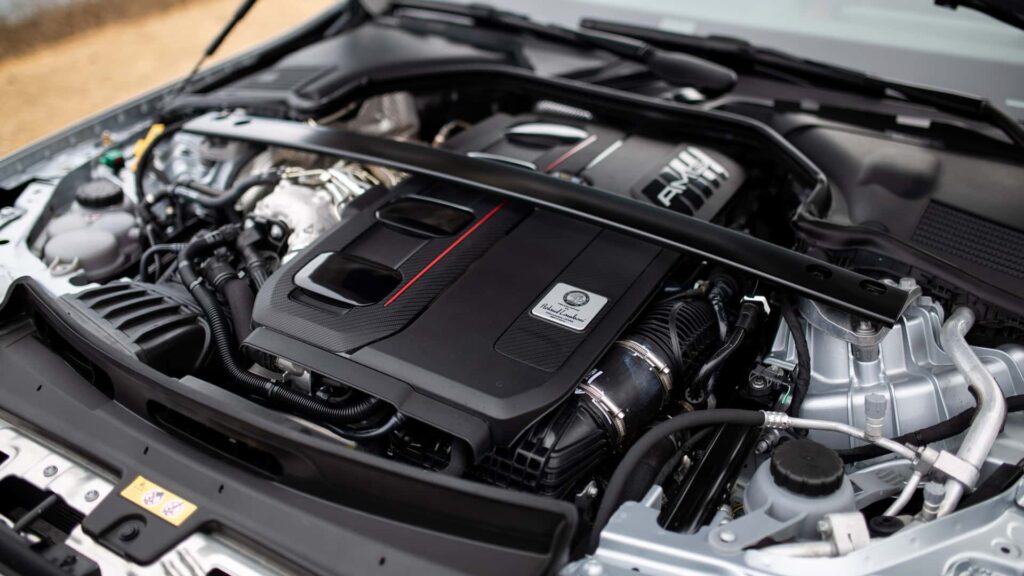
Mercedes-AMG has publicly acknowledged the challenges faced by its four-cylinder hybrid engine, marking a significant shift in its strategic direction. The company, renowned for its high-performance vehicles, is now focusing on developing a new V-8 engine after admitting that the electrified 2.0-liter engine failed to resonate with its traditional customer base. This revelation was made by a senior company official, who spoke under anonymity, highlighting the disconnect between the innovative drivetrain and consumer expectations.
According to a report by Autocar, the executive stated, “We’ve recognized that [people didn’t like it],” despite the engine being touted as “one of the most advanced drivetrains available in a production car.” The M139l engine, which powers models such as the C63, GLC63, SL43, and GT43, is not only expensive to produce but also faces challenges in meeting the upcoming Euro 7 emissions standards.
The Cost of Innovation
The intricate four-cylinder engine, while technologically advanced, has proven costly to adapt to stricter emissions regulations. This development is surprising, given that the shift from a V-8 to a plug-in hybrid was initially perceived as a compliance measure with EU regulations. The same Autocar source noted, “There’s no doubt about its potential, this is one of the most sophisticated engines we’ve ever built, but the investment to make it EU7-compliant is very high.”
Despite its sophistication, the M139l engine’s future is uncertain. Mercedes-AMG has hinted at a gradual phase-out, with plans to enhance its inline-six engine lineup. This move aligns with the broader industry trend towards hybridization, as pure combustion engines face obsolescence in Europe and beyond.
Strategic Shifts and Market Reactions
The future of the C63 model remains in flux. Although Mercedes-AMG previously indicated that a V-8 version of the current generation was not in the pipeline, rumors suggest a potential early retirement for the C63 and C43 models. These could be replaced by a six-cylinder C53, utilizing the M256M powertrain—a 3.0-liter mild-hybrid engine found in models like the E53 and CLE53.
This strategic pivot reflects Mercedes-AMG’s response to consumer feedback and market dynamics. The shift back to larger engines marks a reversal from previous statements by executives such as Mercedes Australia CEO Jaime Cohen, who likened the acceptance of four-cylinder AMGs to the widespread adoption of smartphones. Similarly, AMG CEO Michael Schiebe had praised the current C63’s “very, very progressive” drivetrain.
Lessons Learned and Future Prospects
Despite initial optimism, Schiebe admitted that the company “probably could have better explained” the complex plug-in hybrid setup, acknowledging that the transition alienated V-8 loyalists. He emphasized the importance of open-mindedness towards new technologies, yet recognized the challenges in shifting consumer perceptions.
In hindsight, the decision to maintain the C63 name and pricing strategy may have contributed to its lukewarm reception. Comparisons with competitors like the BMW M3, which offers a six-cylinder engine with manual transmission options at a lower price point, further complicated the C63’s market position.
“If they had named it the C53 and priced it accordingly, the backlash might’ve been softer,” an industry analyst suggested.
Looking Ahead
As Mercedes-AMG recalibrates its approach, the company is poised to re-engage its loyal customer base with a renewed focus on larger, more powerful engines. This strategic shift underscores the ongoing balancing act between innovation and tradition within the automotive industry.
The move back to V-8 engines, coupled with the development of hybridized inline-six options, positions Mercedes-AMG to navigate the evolving regulatory landscape while catering to consumer preferences. As the company charts its course forward, it remains to be seen how these changes will impact its market standing and brand legacy.





